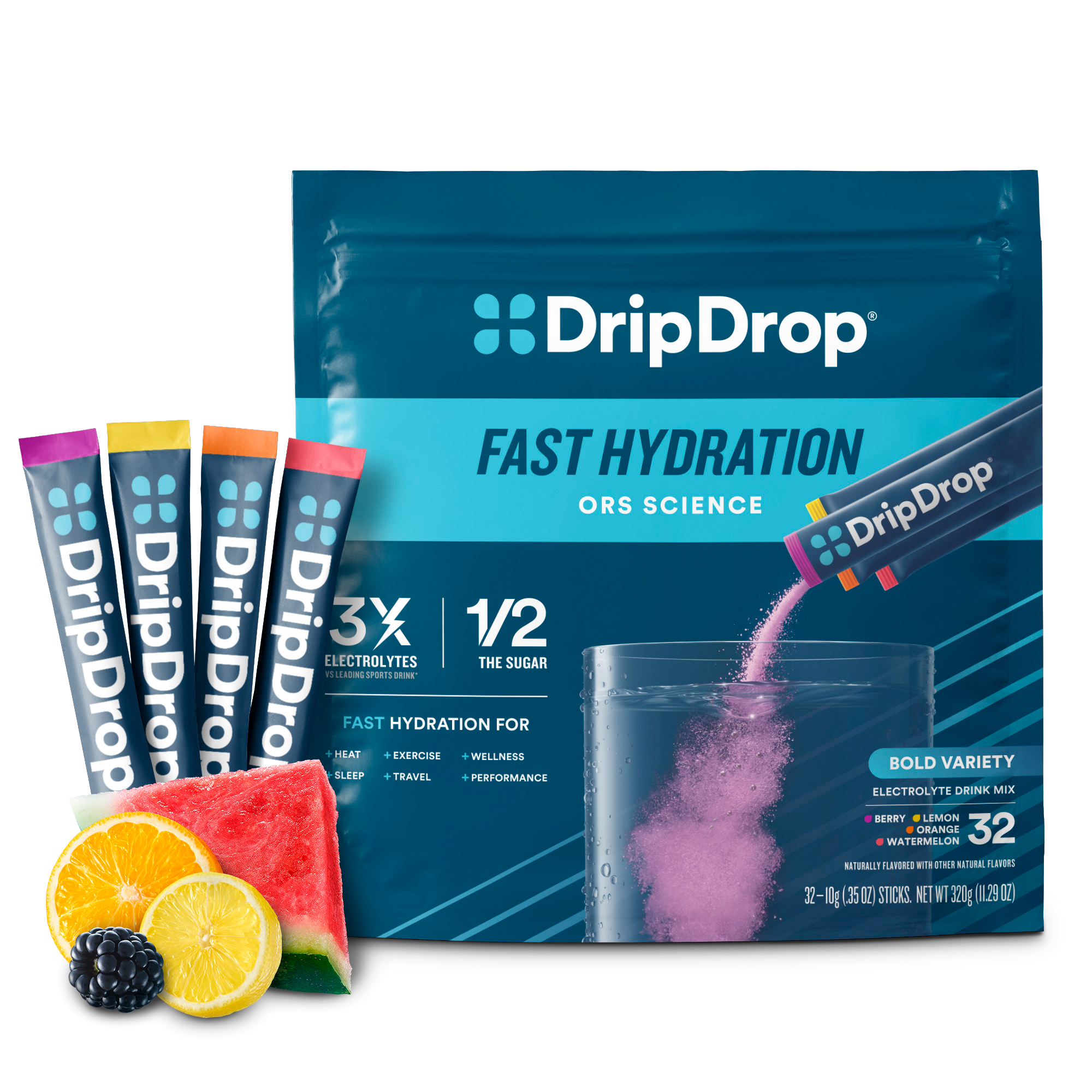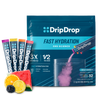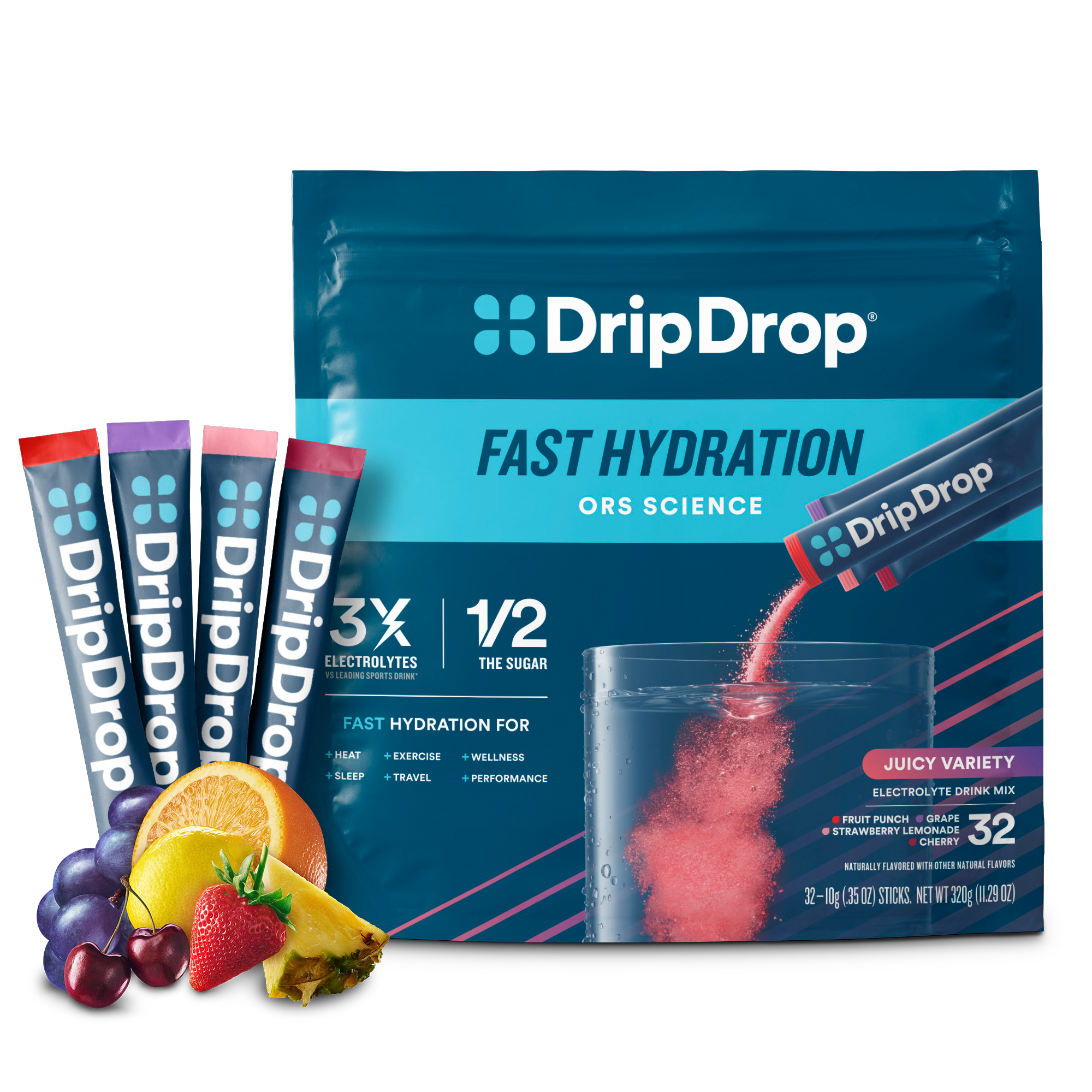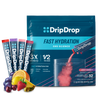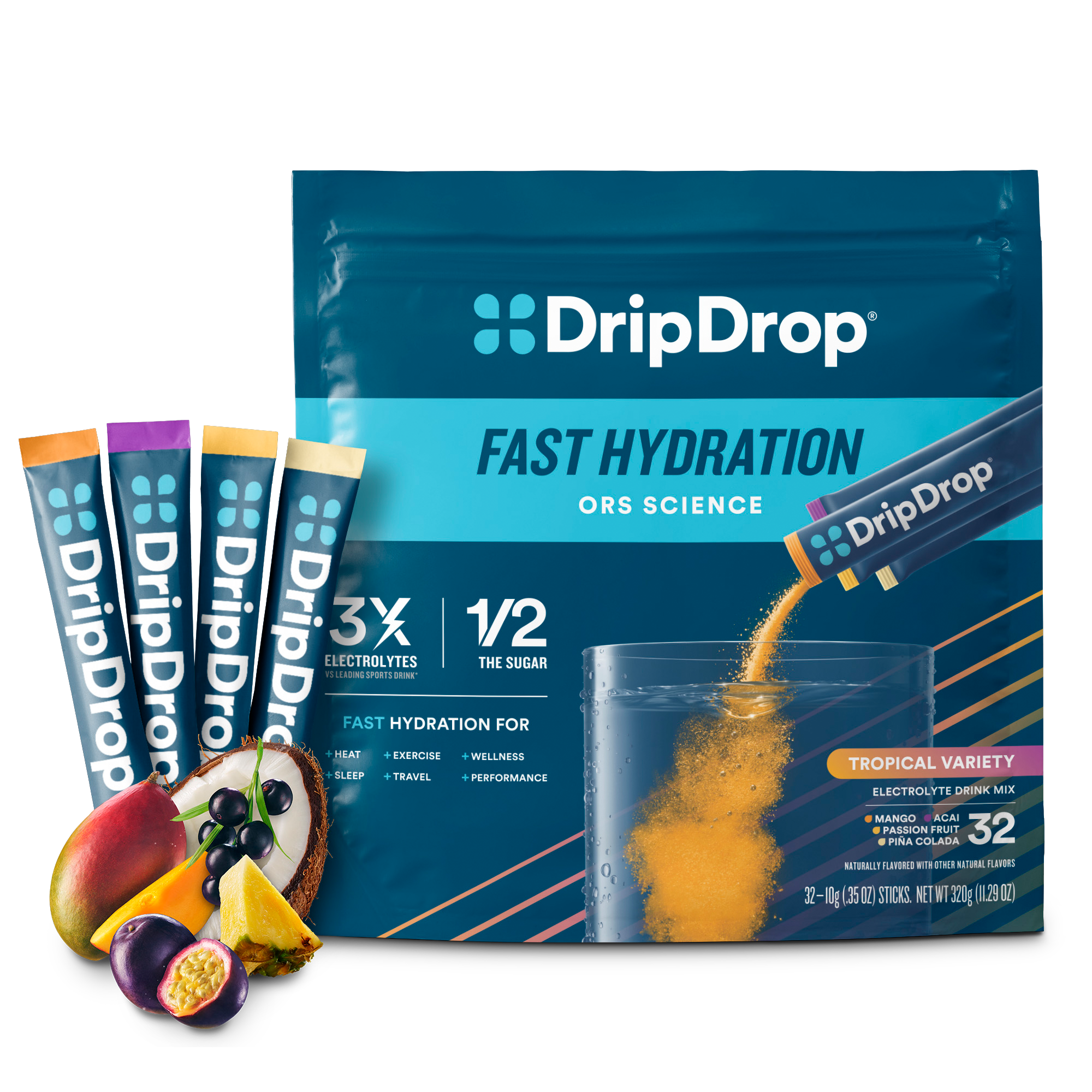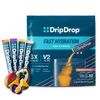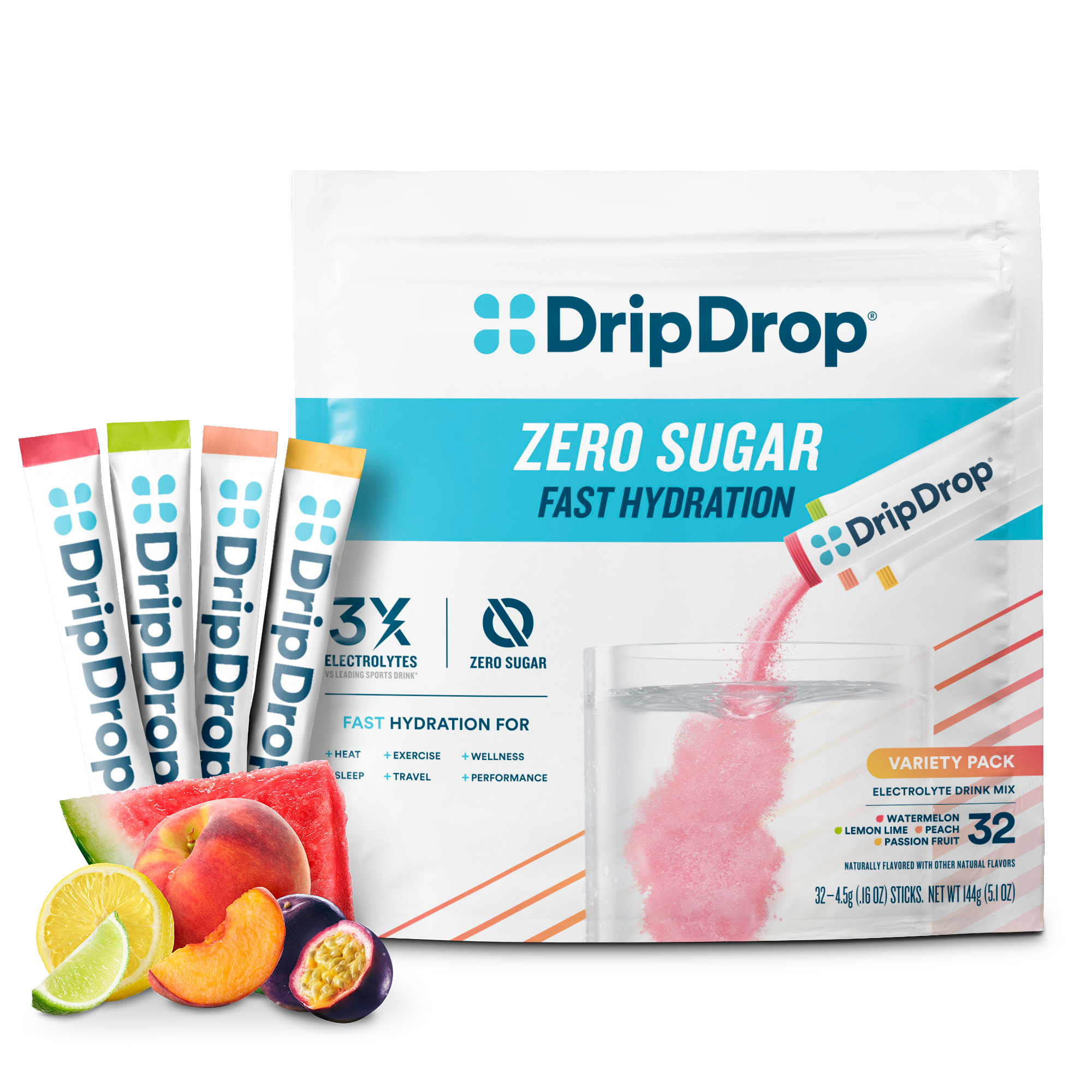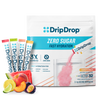The human body needs electrolytes — in the form of essential minerals including sodium, potassium, and calcium — in order to function properly. Electrolytes play a key role in muscle contractions and help the body maintain a proper fluid balance. They help regulate blood pressure and play a role in healing and rebuilding damaged tissue.
When the body loses electrolytes, it cannot complete these functions as normal. There are many ways in which the body can experience a fluid and electrolyte imbalance. Electrolyte water options including oral rehydration solutions can help restore a healthy electrolyte balance. Here, we’ll explain more about electrolytes, what happens when you experience an imbalance, and how electrolyte water or oral rehydration solutions can help.
What Do Electrolytes Do?
As mentioned, natural electrolytes play an important role in human body functions. Humans get electrolytes from foods and drinks. These minerals become electrically charged when mixed into fluids like blood and water. The electrical energy helps to carry out vital processes.
Balanced electrolyte levels are important for:
- Maintaining alkalinity of pH levels in the blood
- Regulating fluid levels in the human body
- Transmitting signals from nerves, muscles, and cells throughout the body
- Building tissue and clotting blood
- Contracting muscles
The six main electrolytes are potassium, sodium, chloride, bicarbonate, calcium, and phosphate. These minerals direct water and fluids to where they’re needed most, helping to maintain homeostasis and fluid balance.
Electrolyte Imbalance
The human body loses electrolytes through a variety of activities. When this happens, you may experience symptoms, including dehydration — a condition where the body doesn’t get enough fluids.
Here are the main causes of an electrolyte imbalance:
- An illness that causes vomiting or diarrhea
- Heat-related illness such as heat exhaustion and heat stroke
- Intense exercise or labor during hot weather and high humidity
- Not drinking enough fluids
- Medical conditions such as respiratory ailments, including emphysema
- Certain medications including diuretics and laxatives
Electrolyte imbalances cause symptoms of discomfort. When you don’t have the right fluid balance, you may have symptoms like headaches, irregular heartbeat, and fatigue. You may also experience muscle cramping, digestive upset, irritability, and confusion. Most of these symptoms are attributed to dehydration.
What Is Electrolyte Water?
Electrolyte water is different from drinking water or tap water because it's enhanced with minerals like sodium and potassium. Plain water contains only trace amounts of electrolytes while electrolyte drinks are fortified with minerals that support healthy body functions.
This category of drinks includes things like sports drinks, coconut water, juices, and oral rehydration solutions. Not all electrolyte waters are the same. In fact, many of these beverages — particularly sports drinks and energy drinks — are less effective than other options like oral rehydration solutions. That’s because sports drinks like Gatorade, Propel, and juices contain large amounts of added sugars and sweeteners and lower amounts of sodium.
On the other hand, oral rehydration solutions like those recommended by the World Health Organization are more effective. Oral rehydration solutions like DripDrop contain a precise ratio of minerals, including sodium and potassium to help fight dehydration. The precise amounts of each mineral are designed to maximize the sodium glucose cotransport system to deliver the exact amount of minerals the body needs to function.
Research on the Benefits of Oral Rehydration Solutions
Oral rehydration solutions are the most effective choice when it comes to electrolyte balance replenishment. It’s particularly useful when the body loses electrolytes due to strenuous activity, illness, or hot weather. Here are some of the health benefits of ORS, backed by science.
Sports and Exercise
When we work out or partake in strenuous activity, we lose electrolytes through sweat. Sodium and chloride are the primary minerals lost through sweat, though potassium, magnesium, and calcium are also lost at lower levels. In fact, the human body loses an average of one gram of sodium for every one liter of sweat.
Water loss equivalent to more than 2% of your body weight can result in a fluid imbalance and electrolyte loss that impacts performance and overall health. Not only does water loss affect sports performance, it can also lead to serious conditions including dehydration. Left untreated, dehydration can affect thought processes and result in confusion, lightheadedness, fainting, and headaches.
According to the American College of Sports Medicine, endurance athletes should consume fluids before, during, and after strenuous exercise. This also applies to people who work in the field — including military service members, law enforcement officers, laborers, and first responders. People in these professions don’t have the luxury of taking the day off simply because temperatures rise. Oftentimes, they must do their jobs in extreme conditions that increase the likelihood of fluid imbalance.
Research shows that sports drinks are an inefficient way to treat electrolyte imbalance caused by dehydration. These drinks often contain too much sugar and not enough minerals like potassium and sodium. Instead, researchers suggest using an oral rehydration solution — like DripDrop — which contain a precise formulation of electrolytes.
Illness
Illnesses and infections are a key contributor to electrolyte imbalances. Vomiting and diarrhea result in a rapid loss of electrolytes, leading to dehydration if the fluids aren’t replenished fast enough. Children are particularly susceptible to fluid imbalances caused by diarrheal diseases.
For decades, the WHO and other organizations including Unicef and the CDC have recommended the use of oral rehydration solutions to treat dehydration caused by diarrheal disease. When used rapidly and effectively, the WHO found oral rehydration solutions decreased the mortality rate to less than 1% when treating dehydration in cholera patients.
When you’re sick, it can be hard to keep fluids down, especially if your illness symptoms include vomiting. Try taking small sips of oral rehydration solutions every few minutes to avoid upsetting your stomach.
Heat
Heat and humidity are two factors that can increase the likelihood of electrolyte loss. During heat waves and when the heat index is above 90 degrees Fahrenheit, the risk of dehydration increases substantially.
One study published in the Journal of Occupational Health found that drinking an ORS may help prevent dehydration on job sites in high temperatures, reducing the incidence of worksite accidents. Additional research shows oral rehydration solutions help address mild dehydration in relation to heatstroke and heat exhaustion.
How To Use an Oral Rehydration Solution
Oral rehydration solutions are among the most effective electrolyte waters. They’re formulated with precise amounts of minerals to help replenish electrolytes lost during strenuous exercise, in hot weather, and when you’re sick. Instead of reaching for a less effective sports drink, grab a glass of DripDrop to help ease dehydration.
Oral rehydration solutions are easy to use. Just take a DripDrop packet and pour the powder into a glass of water or your favorite water bottle. Choose from flavors ranging from watermelon and lemon to berry and orange.
Check out our Subscribe & Save program when you decide to include DripDrop in your dehydration protocol.



